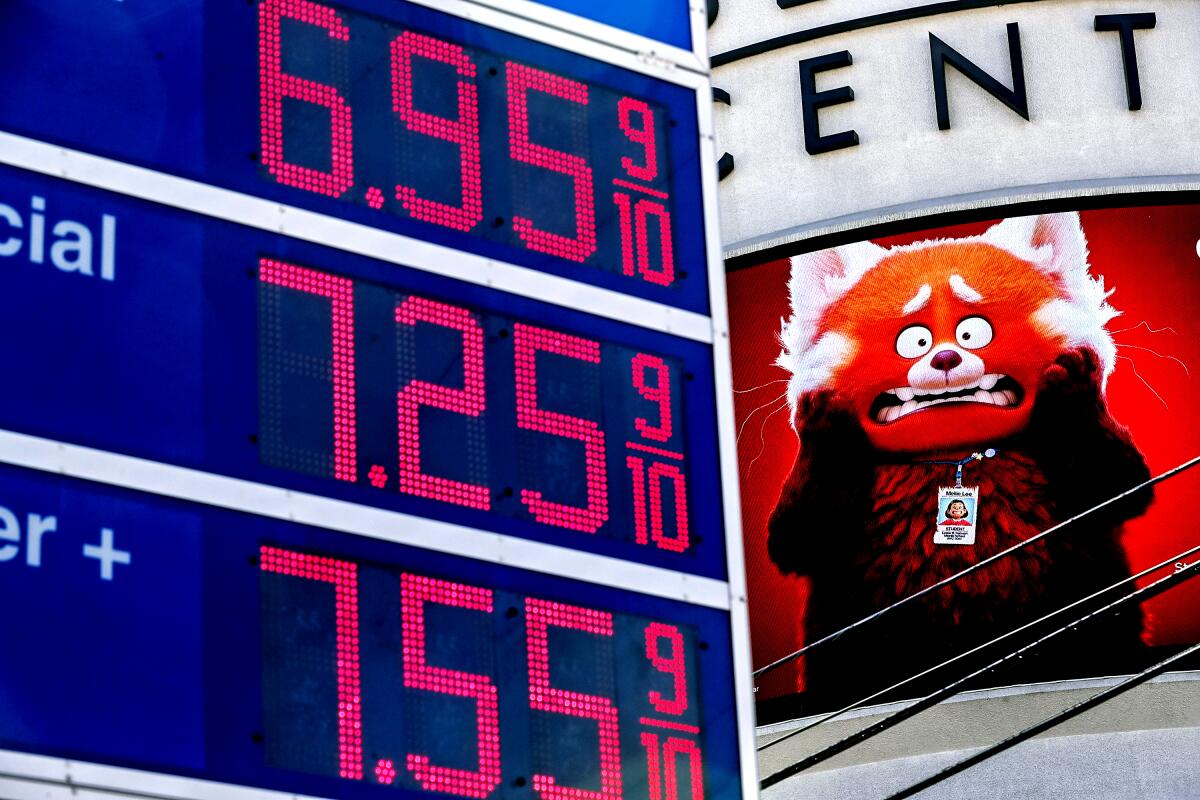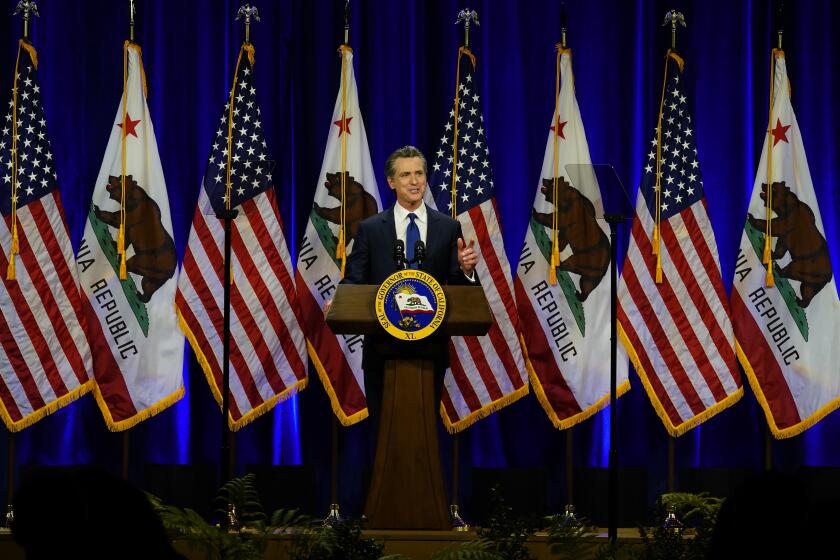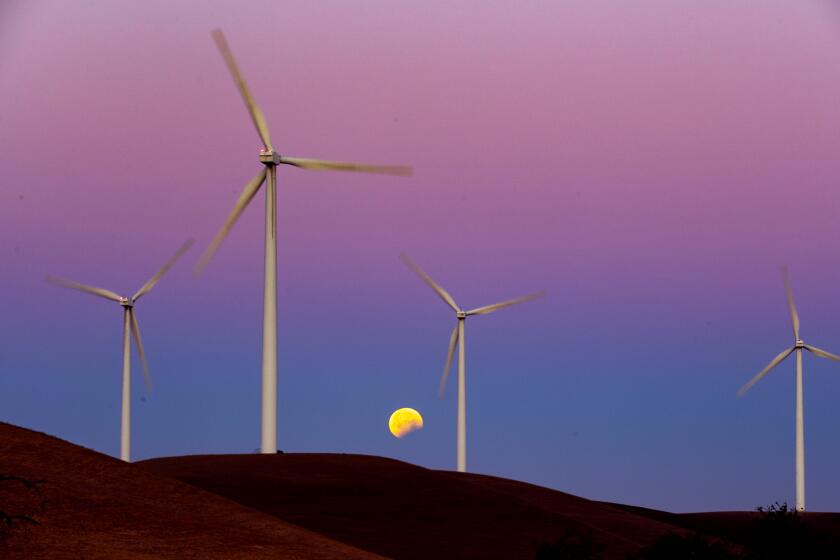Gov. Gavin Newsom’s $400 rebate throws carless Californians under the bus

- Share via
Why, oh why, did Gov. Gavin Newsom decide to stick it to carless Californians?
On Wednesday, the governor unveiled his plan to give car owners up to $800 in debit cards as relief for high gas prices. For people too poor to afford a car or who choose to forgo car ownership but are still dealing with the biggest jump in consumer prices in 40 years, well, no debit cards for them.
If approved, Newsom would send individuals $400 per registered vehicle, including motorcycles, capped at two vehicles per person. Why would Newsom decide to shower money on car owners — even people with electric vehicles will get debit cards — and give short shrift to carless Californians?
Gov. Gavin Newsom’s proposed tax rebate to help Californians with rising gas prices and inflation should apply to all residents, not just car owners.
Newsom’s proposal does include $750 million for transit agencies to provide free or reduced fares. His office said the money should be enough cover free bus and rail service for three months. It also includes $500 million for projects to promote walking and biking, and fast-tracks spending for electric vehicle incentives and charging infrastructure. That’s all good.
But those investments are a pittance compared with the $9 billion he wants to spend on the debit cards. And free transit is not an equal value for many riders. A monthly pass for Los Angeles Metro’s buses and rail lines costs $100 (and passes are discounted to $50 through July 20), so even with three months of free transit, carless riders are still getting shorted by Newsom’s proposal.
Newsom is also choosing to subsidize car owners at a time when the state is trying to reduce its reliance on fossil fuels and encourage people to drive less. High gas prices can be a powerful motivator for consumers to change their behavior or their vehicles. Simply sending debit cards to vehicle owners and offering three months of free transit feels like a missed opportunity when the state could seize the moment to encourage people to make lasting changes.
Editorial: What’s better than a ban on Russian oil imports? Ending our dependence on fossil fuels
Banning U.S. imports of Russian oil shows the inherent danger in our reliance on fossil fuels. The solution: Dramatically accelerate renewable energy.
We get it. Newsom is trying to show voters that he’s doing something to ease the impact of rising gas prices ahead of the coming election, and sending a rebate to owners of registered vehicles is a simple way to get money out quickly. That will help him (although he doesn’t face a tough reelection) and Democrats, particularly those in swing districts where rising gas prices are a political liability. And Newsom can afford to be generous. The state has such a massive budget surplus that under the state’s constitutional limit on spending, known as the Gann limit, a tax rebate may be required anyway.
But why propose a rebate program that creates winners and losers, especially when the winners include wealthy households with multiple cars and the losers include low-income households that can’t afford one? It’s extra mind-boggling that Newsom has continued to focus on a driver’s-aid program, when Democratic legislative leaders have offered a more equitable (and cheaper!) proposal to send rebate checks to most Californians, whether they own a car or not, in acknowledgment that inflation has pushed up prices for all the essentials, not just gas.
One group of lawmakers proposed sending $400 checks to all taxpayers. But a wiser use of taxpayer money comes from Senate President Pro Tem Toni Atkins (D-San Diego) and Assembly Speaker Anthony Rendon (D-Lakewood), who want to give $200 to most taxpayers and their dependents, with the payments limited to individual taxpayers with $125,000 or less in taxable income and up to $250,000 for joint filers, which would cover 90% of taxpayers. They also want a separate program to get rebates to low-income non-tax filers. It makes sense to target payments to those who need relief the most.
If lawmakers are serious about transportation infrastructure and climate change, they will reject feel-good, do-little proposals to temporarily roll back gas taxes.
And there’s another concern with Newsom’s proposal: He wants to enact a gas tax holiday on parts of the state’s gasoline and diesel fuel taxes. While that may sound good — who doesn’t want a break from taxes? — it’s problematic for several reasons. Delaying the inflation-adjusted increase to the gas tax might save motorists $15 a year but cost the state half a billion dollars in transportation funding. Plus, there’s no guarantee it will result in noticeable savings for consumers at the pump; oil companies and world markets influence the price per gallon far more than gas taxes.
Fuel tax revenue pays for transportation infrastructure, so a gas tax holiday means less money for roads, bridges and transit — unless Newsom and lawmakers commit to backfill all of the foregone revenue. And what happens next year if gas prices remain high? How long can California delay collection of this much-needed source of transportation funding?
Newsom is right that Californians are struggling with high prices, and the budget surplus should be used to help. But the governor’s proposal misses the mark.
More to Read
A cure for the common opinion
Get thought-provoking perspectives with our weekly newsletter.
You may occasionally receive promotional content from the Los Angeles Times.












